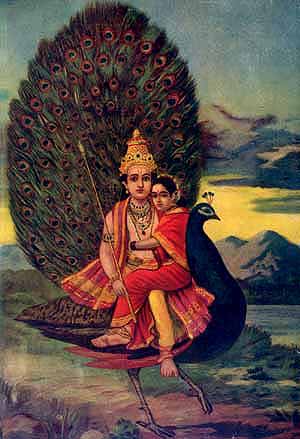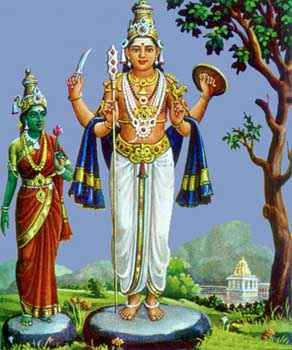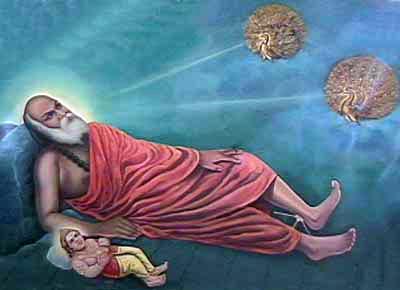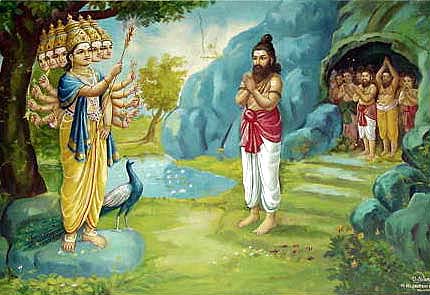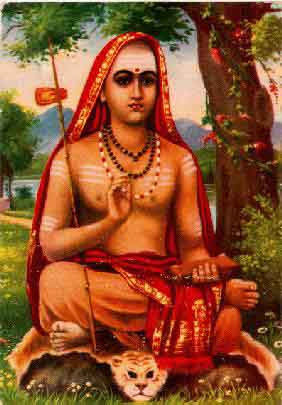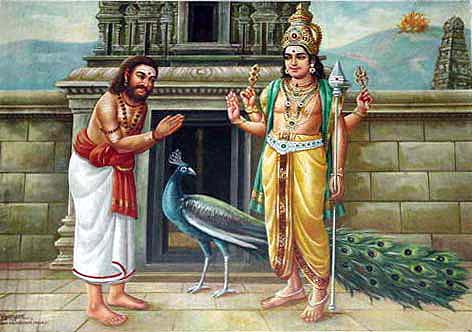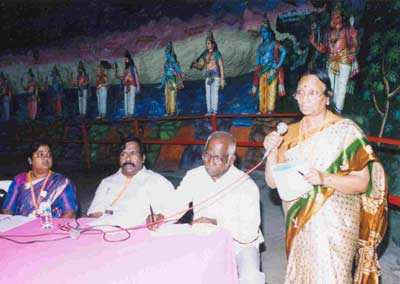
|
|||||||||||||||||||||
|
| |||||||||||||||||||||
Murukan, The Protector and HealerProf. Mrs. V. BalambalIndian life is interwoven with religion. The Hindu pantheon is filled with innumerable gods and goddesses and various modes of worship are followed. The major Trinity consists of Brahma, Siva and Vishnu. Their consorts Saraswati, Lakshmi and Parvati are given higher status. Ganesa also known as Pillaiyar, Ganapati, Vinayaka or Vigneswara is the elder son of Siva and Parvati and an affectionate brother of Murukan, the favourite god of the Tamils. Other than the major deities, several minor deities are also in vogue. Though Hinduism is a way of life as stated by Dr. S. Radhakrishnan, a deeper study of Hinduism with its subdivisions clearly proves that it is more than that. Toleration could be seen in this religion making it easily approachable to people. It has been the practice from Vedic times to invoke the deities by performing rituals and sacrifices, singing in praise of them, and conducting festivals too. Everyone has the right to have devotion to his/her favourite god. Murukan has been worshipped from the Cankam age. In Cankam literature, he is referred to as Seyon, Azhakan, Korravaiselvan, Kumaran, Velan, Marukan, etc. Tirumurukarruppadai, one of the Ten Idylls (Pattuppattu) written by Nakkirar, gives a detailed account of the six abodes of Murukan and his heroic deeds too. There are many references to Murukan in other Cankam literary works. Though much reference to Murukan is not available in Vedic literature, he is known from puranas, and other works as Karttikeya, Subramania, Skanda, etc. He married Devasena and Valli from two different classes: Devasena, the daughter of Indra, the head of the Devas, and Valli, the adopted daughter of the hunter chief. He was the Lord of the Kurinci region (hilly tracts) and as such most of his temples are found on the hills. He is seen with spear in his hand. His mount (vahana) and flag are peacock and cock respectively. He is the embodiment of beauty and valour. He was Tamil Kadavul (Lord of Tamil). He is said to have taught Tamil to Agastya. Murukan's beauty and youth purify the hearts and eliminate sickness and ill health from the devotees. Above all, Skanda's grace brings eternal bliss and everlasting peace. There are many sources to say that Murukan is a great protector of body and soul of his devotees. He is an amazing healer of mental, physical, emotional and psychological diseases of his devotees. Some turned to be his followers after being tested by him or after receiving his grace. Every part of the body is protected by him and every disease could be well treated by him if one has sincere faith in him. Innumerable religious literature such as Subramania Bhujankam (SB) by Adi Sankara, Devaraya Swamikal's Kandasasti kavacam (ksk), Pamban Swamikal's Shanmukakavacam (SK), Arunagirinathar's Tiruppukazh, Kantaralankaram, Kantaranuputi, and other works. Nakkirar's Tirumurukarruppatai, Kumarakuruparar's Muttukumarasami Pillaittamizh, etc., describe the greatness of the Lord. The birth of Murukan itself was to protect Indra and other devas from the clutches of the Asura Surapadma. When the devas requested Siva to redeem them from the demon ruler, six sparks came out of the powerful eye of Siva who gave the sparks to Vayu who in turn handed over to Agni. The fire god left the sparks in Ganges who brought the same to the holy Saravana tank (Saravana poikai). Then the six sparks turned to be six children and were brought up by the six Karttikai pendir. Parvati came there and united all the six into one with six faces, twelve hands and twelve eyes in one body calling him Arumuka. When he grew up as a mighty person, with the grace of his parents and sakti vel, Murukan fought with the Asuras and defeated them. This shows how the Lord protected even the powerful Devas from their distress. Gracing the enemies too was a common thing for Murukan. At the end, when Surapadman surrendered to him he gave permanent protection to the demon king by having one part of him as his mount and the other as his flag (peacock and cock). He healed the wounds of the Devas as they were humiliated by the asuras. All the five elements of nature (earth, vayu, fire, water and space) are associated with him from the time of his birth. All the actions of Murukan are obstacle free as he is the favourite of Lord Vignesvara, his elder brother. Importance of religion in human life could be well understood from bhakti literature. Adi Sankara, Śrī Devaraya Swamikal, Pamban Swamikal and Arunagirinathar narrate in various ways in their hymns their experiences with the Lord and recommend his grace to devotees. By showing sincere devotion to Murukan, one could achieve both material and spiritual bliss. When we call the Lord as the protector and healer, it does not mean physical protection and healing of physical illness alone. There is need for mental and spiritual protection too which is given by Murukan abundantly to his faithful devotees. It is interesting to note that the Lord tests devotees and saves the non-devotees too making them surrender totally to him. Devarayar, Pamban Swamikal, Arunagirinathar, Adi Sankara, Ramalinga Adikal and others narrate in detail how Murukan safeguards and heals his devotees in various ways. Kantasashti Kavacham is not only a devotional literature but a divine gift to Murukan devotees. Devarayar starts his KSK describing the divine beauty of Murukan. This Bhakti literature deals with not only spiritual aspect but also the physical, material and emotional aspects of human life. KSK details the anatomy of human body, various diseases affecting the body, the supernatural elements troubling the body and mind and at last explains the ways and means of getting relief from these physical, mental and spiritual ailments. Simple remedy according to Devarayar and Pamban Swamikal is total surrender to Murukan who is the redeemer. Faith in Murukan brings forth good things to and destroys evils against the devotees. The favourite weapon of Skanda is the spear. It is used by the Lord not only to destroy the enemies and evildoers but also to protect his devotees from various obstacles and opponents. The poet-devotees mention azhakuvel, punitavel, nalvel, munaivel, peruvel, sevvel, katirvel, iniyavel, ratnavel, tiruvel, vativel, arulvel, paruvel, vetrivel, ayilvel, ayilvel, valvel, arulvel, karunaivel, ethirvel, kanakavel, vajravel, anaiyavel, ethirvel, caturvel etc which protect all parts of the human body (KSK. ll. 71-109). Head, face, forehead, eyes, ears, nose, mouth, cheeks, tongue, thirty two teeth, neck, chest, breast, back neck, back, sixteen ribs, stomach, hip, womb, buttocks, anus, thighs, knees, ankles, feet, toes, hands, arms, naval, veins, genitals, etc. It is interesting to note that Devarayar does not omit any part of the human body to be protected by the Lord. Each part is prone for some disease and by pure devotion one could win the attention of Kumaran who would protect his devotee from any danger. Murukan, the symbol of valour, grace, strength, power, knowledge, and beauty, does wonders to protect the body and soul of his followers. The devotees need his protection during day and night as they do not know when or by whom they would be affected. If one is to be protected by the Lord, he should get the grace of the Omnipotent in various ways. Those are: chanting the different names of the Lord; performing rituals, abhisekam, dance and music to please the Almighty; conducting festivals etc. With his twelve eyes he would grace his devotees; with his twelve hands he is there to protect them and destroy the evil- doers. People believe in good and bad spirits and ghosts. These are used by wicked people to cause good and bad effects. Devarayar believes that his strong faith in Murukan would safeguard him from the evil effects of the powerful spirits, child eating ghosts, demons, women-chasing ghosts, Irisi, Katteri, Karuppu, and various other evil spirits causing damage to life and prosperity. The Lord will protect the devotee by binding and rolling these bad elements to destruction. These evil spirits would be put into all sorts of sufferings by the grace of Murukan and the devotee would be protected from all dangers. (ll. 104-146) In this decaying world, people are harmed by wild animals and various poisonous insects. Skanda's grace would protect the devotee from them too. Devarayar narrates it beautifully in KSK. He has included almost all living beings in his list in this context. Wild and trouble causing Tiger, wolf, fox, rat, bear, would be made to runaway from the devotee by the Lord. Even if he was bitten by the most poisonous scorpion, snake etc. the Lord protects him from the effects of poison. (ll. 150-154). Health is wealth. It is essential to have a sound mind in a sound body. Every part of the human body is affected by some disease. Devarayar mentions different types of physical ailments like severe headache, bile, vomiting, fatigue, tuberculosis, itches, skin diseases, boils, abscess, tumours, toothache, neurotic problems which would be healed by the grace of Murukan. Devarayar was confident that these diseases would vanish as soon as they hear the name of Lord's devotee; even if affected, he would be cured by the Lord. (ll. 154-164). What is to be understood in this context is that the devotee could take any liberty with the Lord to ask for his grace to protect him from all sorts of dangers, eventualities, sickness of the body and mind.
Pamban Swamikal, another great devotee of Murukan has expressed in his Shanmuka kavacam not only his devotion but also the greatness of the Lord in all spheres. After great ordeals he realized the greatness of Kumaran. He met with an accident at Chennai in 1923 and his leg bone was severely broken. Even when the doctors themselves lost hope, the great Protector appeared before him in the form of two peacocks and touched his leg and cured him. The doctors were wonder struck at his recovery. He had the vision of Bala Murukan who touched his broken leg with his powerful spear. This miraculous healing of Murukan enabled Pamban Adikal to sing the Shanmuka kavacam, which similar to the KSK of Devarayar, praises the Lord, describes his beauty, expresses firm belief in the Lord who would come to the rescue of his devotee in times of distress and protects and heals him in all possible ways. He also describes various ailments, enemies, attacks, opponents, physical and mental ailments affecting human beings and how one could be protected and healed by the grace of the Lord. What is needed is unconditional surrender and devotion which even make the devotee to command the Lord for help. Vallimalai Swamikal experienced the ultimate bliss as a devotee of Skanda. He suffered due to
Balasubramaniam was a deaf and blind son of a couple devoted to the Lord of Palani. The parents came to Palani and pleaded to Palaniyandi to cure their child. The Lord is said to have applied the sacred ashes and blessed him with sight and speech. The child became a great poet and sang the sthalapurana of Palani. (Ibid. p. 128) Similarly Murukan cured Mambazhakavi when he was affected by smallpox. These instances clearly show the love and care the Lord had for his devotees. Velan showed great concern for Kumarakurubarar who was born dumb. His parents brought him at the age of five to Tiruccentur and started their penance to the god for the recovery of their son. Murukan appeared at night before the boy and wrote in his tongue with his spear. Immediately, to every body's surprise Kantarkali Venba was sung by the dumb boy. The Lord listened to the sincere prayers of the parents and healed the boy of his dumbness and protected him. The sacred hymn gives a detailed account of the beauty, valour, achievements, the six abodes of the Lord, and how he would be able to safeguard the devotees from physical, mental, emotional, psychological and spiritual ailments. Achieving the ultimate bliss is the aim and desire of the devotee. He has narrated in his Muttukumarasami Pillaittamizh the beauty of child Murukan at Vaitisvarankoil in Tancavur district. When Nakkirar and nine hundred and ninety nine poets were imprisoned and were about to be eaten by Karmuki, the ghost, the poet sang
There are many references to Avvaiyar's relationship with Murukan. When he tested her mental strength, she fell prey to him due to her ignorance which is also a disease to be cured. Murukan, in the form of a shepherd boy healed her ignorance by making her understand what he meant by hot fruit (cutta pazham). Avvaiyar was in a state of ‘maya' and Lord Murukan brought her to light. Even the wisest Avvaiyar was to be mentally protected and healed by the Lord. (Tiruppukazh, 441). Pride is another
disease of the mankind. It ruins relationship and progress. Murukan is the
healer in this aspect too. Poyyamozhi, a great Tamil poet who has authored Tancaivanankovai
was a Siva bhakta and refused to sing on any other god, especially
Murukan, stating that he would sing on cock (Siva), not on chicken (Murukan). Pride
associated with ignorance is a big disease. The Lord wanted to protect him and
heal him, though he was not his devotee. He took the form of a hunter and
chased the poet. When the latter pleaded for relief, the hunter asked him to
sing on him. The poet asked for his name. The hunter said it as egg (muttai).
To safeguard himself from the fierce hunter, Poyyamozhi sang in praise of muttai.
Immediately the hunter asked him why he sang on egg when he did not even
want to sing on the chicken. The poet realized that the hunter was Murukan
himself and he repented for his pride and ignorance. God relieved him of the
same. (Tiruppukazh)
Adi Sankara was a great Advaitin. He sang in praise of Siva, Vishnu, Sakti and Skanta. Subrahmanya Bhujangam of Sankara speaks of his experiences with Murukan at Tiruccentur. There was some purpose in his visit. When Sankara was propagating Advaita, he had to face the opposition of Abinava Gupta who caused Sankara a chronic disease. Sankara suffered a lot. Siva came in his dream and instructed him to go to Jayantipuram (Tiruccentur) and worship Murukan. Immediately Sankara set out for Tiruccentur and offered his prayers to the Lord. He was able to see Adisesha worshipping Murukan in the sanctum. He sang the Subramania Bhujankam and was cured of his disease. He describes the inner and outer beauty of Murukan and how each part of the Lord's body was capable of protecting the devotees and destroying the enemies. As a devotee of Murukan, he had the strong hope that even when the assistants of Yama, the God of Death arrived in front of him, Skanda would appear and protect him by driving them away. Even diseases such as leprosy, fits, tuberculosis, madness, high fever, stomach pain and the evil spirits would disappear by seeing the sacred ashes of the Lord (verse. 25). If any damage is caused by an animal or disease, the mighty spear of Shanmuka would ruin them. The beautiful and meaningful verses of Sankara were the base for the later Kantasasti kavacam and Shanmuka kavacam in which the authors describe the beauty of Murukan, expecting the Lord's protection from illness and evil spirits with the mighty spear of various names (verse. 29). Sankara who is said to have performed miracles sought the protection of Lord Murukan from his enemies, diseases and death. Arunagirinathar, the author of Tiruppukazh, was a pleasure seeking man in his early life. He repented for his sins and tried to commit suicide as he could not be cured of his disease. Then came the Protector, Lord Murukan. Arunagiri was not even a Murukan devotee. Perhaps the Lord knew that he would turn to be a staunch bhakta.
Murukan does not stop with physical and mental protection and healing of the devotees. He gave intellectual protection too. It is known from the life of Arunagirinathar. Sambantandan, a staunch devotee of Kali was jealous of Arunagiri and challenged him to show Murukan as he was capable of inviting and presenting his goddess Kali to Arunagirinathar. With great faith in the Lord Arunagiri sang the Tiruppukazh, 'Atala cetanarata' and the Lord appeared before him and snubbed the headstrong opponent. The king of the region punished the haughty Sambantandan and honoured Arunagirinathar. He was once again protected by Murukan when Villiputhur Azhwar had a verbal battle with him at Tiruccentur. The Azhwar had the practice of cutting the ear of the defeated person. But in his dual with Arunagiri, Azhwar lost and as a fair person tried to cut his own ear. But Arunagirinathar stopped him from that act and requested him not to continue that crude practice. His protection by the merciful Lord made him merciful even to his own challengers. In many Tiruppukazh he seeks safeguard from worldly pleasures which ruin ones body and soul; requests the Lord to redeem him from various pressures and destructions; realizes the ultimate abode is the lotus feet of the Lord. Kumara's feet, anklets, twelve shoulders and the kadamba garland would definitely save him from bad omens, bad planets, and the god of Death. Arunagirinathar's sacred hymns narrate all aspects of worldly and spiritual life and explain what the ultimate bliss is. Gunasilar, a great devotee of Murukan was challenged by an arrogant scholar named Prativati Bhayankaran who wanted to boast himself before the docile Gunasilar. Very proudly he started singing about the Nagacalam (‘snake hill') questioning why the snake mound failed to dance opening its hoods. But he could not proceed further because of his arrogance. Murukan came in the form of a shepherd boy and completed the verse by singing that it was due to the fear of being killed by the peacock, the favourite mount of the Lord. Pritivati was astounded by the verse uttered by the shepherd boy and asked him who he was. The boy replied that he wanted to learn Tamil from Gunasilar, but the latter was unwilling to teach him. So the boy decided to be his shepherd and he was able to complete the verse with his listening knowledge. Pritivati apologized to Gunasilar for his arrogance and incapability. It was understood that the shepherd was none other than Lord Murukan himself who came to protect his devotee. (P.L. Muttukrishnan, pp 579-580). Gunasilar realized that the presence of Murukan was to protect him from the humiliation planned by the arrogant scholar. The Lord appeared at the right time to save his devotee from the wrong person. Venrimalai, a faithful devotee of Murukan and an illiterate, served in the temple kitchen at Tiruccentur. The temple authorities humiliated and punished him severely for his small mistake. He decided to commit suicide and jumped in to the sea after praying to the Lord. Murukan saved him from death and turned the illiterate into a great poet who sang the Tiruccentur Sthala Puranam. When he wanted to publicize his writing in the presence of scholars, he was disrespected by his opponents. As nobody supported him, he felt dejected and threw the sthalapuranam into the sea. It reached the shores of Yazhppanam and was saved by a devotee. After some time when the whole region was seriously affected by a virus disease, the place where the sacred palm leaves were kept alone remained unaffected. People were amazed without knowing the reason. Murukan came in the dream of the local people and revealed the secret. The holy text became the common treasure of the people who started reciting it every day. This incident shows the grace of the Lord to his devotee and how he protected him and his composition and popularized it. (P.L. Muthukumaran, p. 62) Kacciappar pronounced amidst scholars his immortalized Kantapuranam for which the initial verse was given by Murukan himself. His opponents found mistake in it and questioned Kacciappar. To protect his devotee, Murukan himself appeared before the scholars and nullified their view by giving proper explanation. This shows the interest of the Lord in protecting the dignity of Kacciappar. Some times even the Vaishnavites showed interest in Murukan worship. When Pakazhikuttar, a Vaishnavite had severe stomach ache, Vadivelan came in his dream and told him to sing Pillaittamizh (songs in praise of the Lord's early childhood) on him. Pakazhikuttar heeded to the command of Kumaran and sang Tiruccentur Pillaittamizh describing the childhood activities of the Lord who healed him of his disease and protected him. This hymn is being sung along with Tiruppukazh everyday in the Tiruccentur temple after all the daily rituals are over. Ramalinga Atikal also known as Vallalar was a great devotee of Shanmuka. Though he was not interested in his studies, to satisfy his brother's wife's request, he planned to study at home. Murukan became his teacher and he in turn transformed himself a great preacher and teacher to the world. Vallalar's Tiruvarutpa (Prartana malai) speaks about the tremendous changes that had taken place in his life when he had Murukan as his Gnanaguru. He realized the need for the grace of the Lord for protection from various vices and for showing the path of goodness. Through his Tiruvarutpa he seeks the helping hand of the Lord to get the friendship of the virtuous people; to speak truth; to be without arrogance; not to have lust for women; to attain good knowledge; to have the grace of Murukan; to live without any disease; not to be greedy; to donate others as much as possible; to speak good words to all; to be relieved of physical and mental strains; to end the sufferings and humiliations etc. All these would be possible to a devotee if he is able to grace of the Lord. Universal brotherhood is explained in Vallalar's Samarasa sanmarkam. There are innumerable instances to show the greatness of Murukan. He is omnipotent and unassailable. Even Adi Sankara insists in his Subrahmanya Bhujangam. Everyone should worship Shanmuka along with his family members as the primary god so that all could get protection of the Lord. In this world of uncertainty, terrorism, tyranny, non-cooperation, backbiting, mudslinging, lack of human values, selfishness, jealousy, unfaith, cheating etc, the grace of the Lord alone would come to our aid to protect ourselves from all dangers, ailments, and oppositions. History has proved that Murukan comes down to the level of the commoners to protect and redeem his devotees from every thing. Unquestionable surrender to the Lord would be the tool with which a devotee could have the Lord as his Protector and Healer. Chanting of the six letter word (Saravanahbava) would enable the devotees to attain eternal bliss. ReferencesPrimary Sources
Published Works
|

